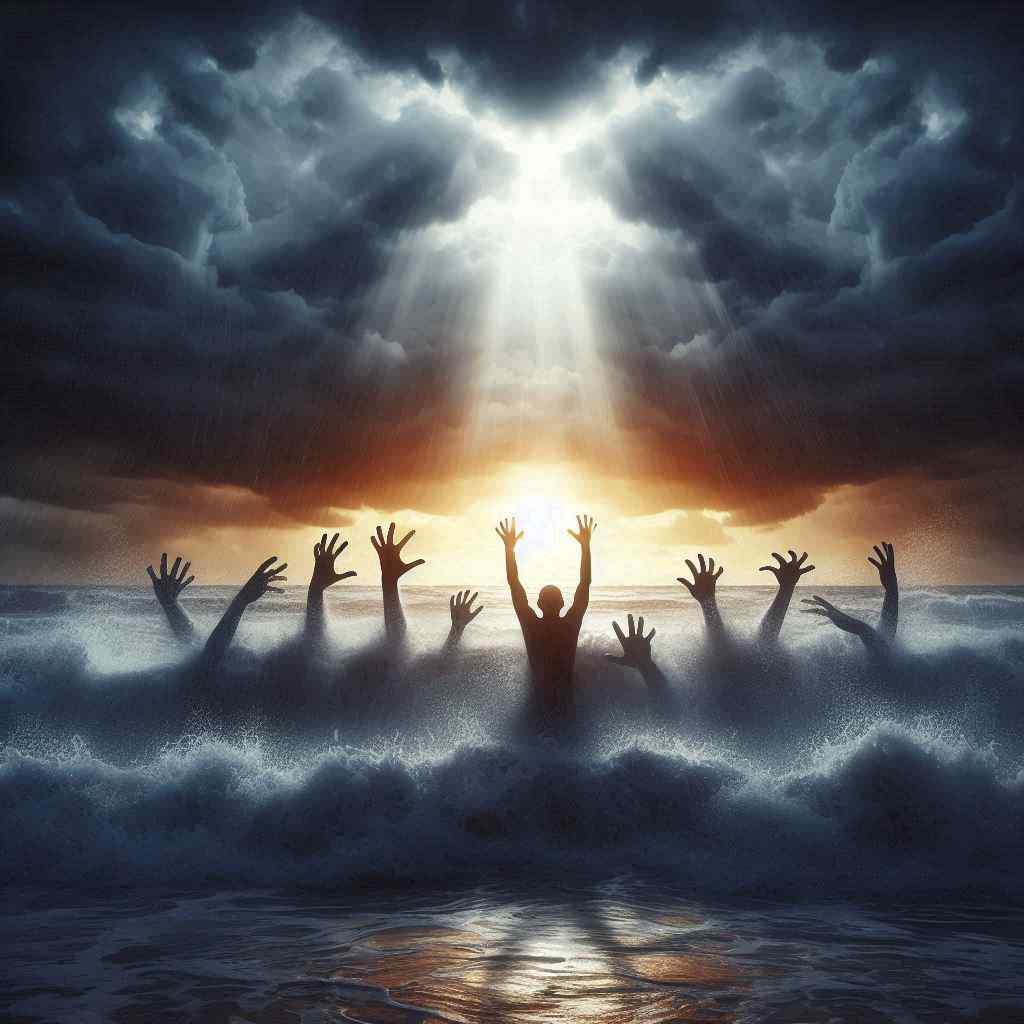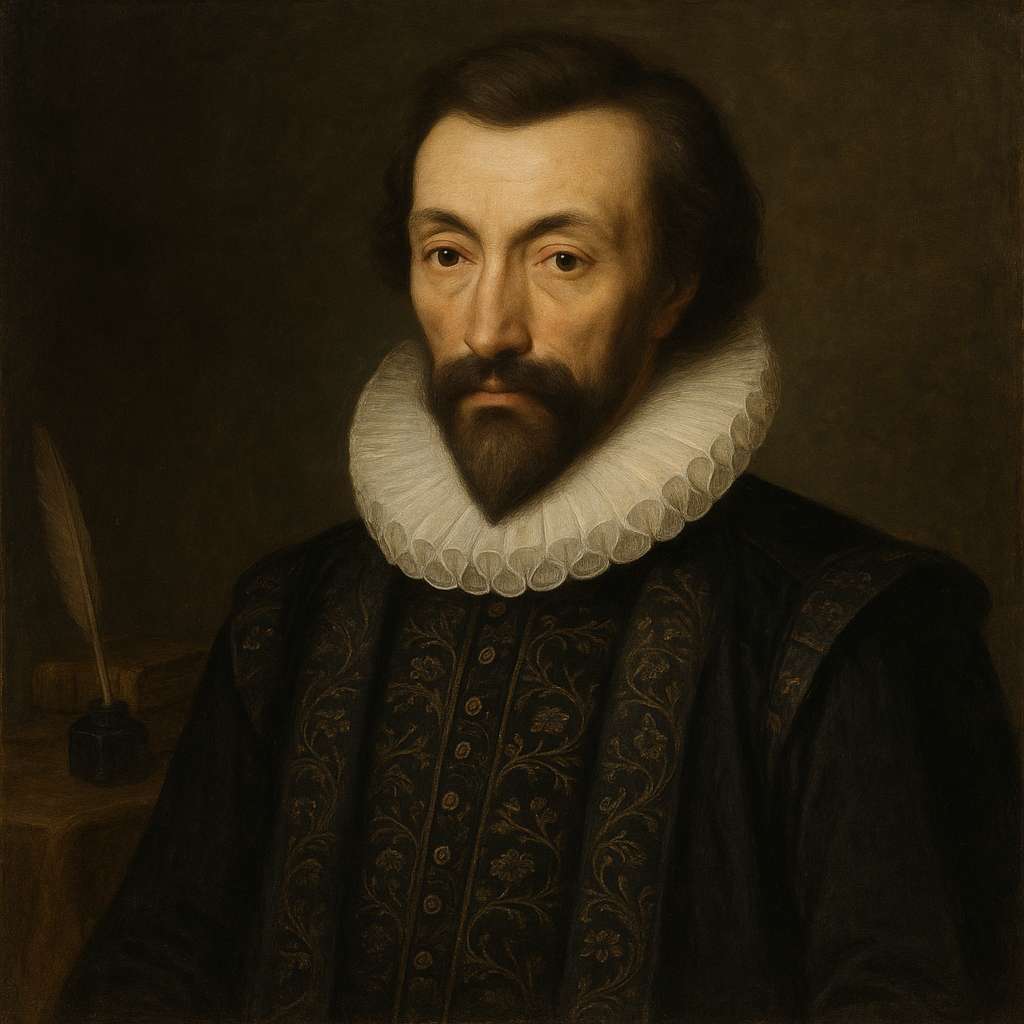A Hymn to God the Father
John Donne
1572 to 1631

Wilt thou forgive that sin where I begun,
Which was my sin, though it were done before?
Wilt thou forgive that sin, through which I run,
And do run still, though still I do deplore?
When thou hast done, thou hast not done,
For I have more.
Wilt thou forgive that sin which I have won
Others to sin, and made my sin their door?
Wilt thou forgive that sin which I did shun
A year or two, but wallow'd in, a score?
When thou hast done, thou hast not done,
For I have more.
I have a sin of fear, that when I have spun
My last thread, I shall perish on the shore;
But swear by thyself, that at my death thy Son
Shall shine as he shines now, and heretofore;
And, having done that, thou hast done;
I fear no more.
John Donne's A Hymn to God the Father
John Donne's "A Hymn to God the Father" stands as a pinnacle of metaphysical poetry, embodying the complex interplay between faith, doubt, and human frailty that characterizes much of Donne's religious work. This poem, written in the latter part of Donne's life when he had become Dean of St. Paul's Cathedral, showcases the poet's mastery of form, his penetrating theological insights, and his ability to infuse deeply personal sentiment into universal themes of sin, forgiveness, and salvation.
Structure and Form
The poem consists of three stanzas, each following a similar pattern. The first four lines of each stanza are written in iambic pentameter, while the final two lines are shorter, creating a rhythmic break that emphasizes their content. This structure mirrors the poem's thematic progression, with each stanza building upon the previous one, culminating in a resolution that is both personal and universal.
The rhyme scheme (ABABCC) contributes to the poem's musicality and reinforces its message. The repetition of "done" and "more" at the end of each stanza creates a refrain-like effect, emphasizing the cyclical nature of sin and the ongoing need for divine grace.
Wordplay and Puns
Donne's notorious fondness for puns and wordplay is evident throughout the poem. The most prominent example is the play on his own name in the repeated phrase "thou hast done" (which sounds like "thou hast Donne"). This clever device serves multiple purposes:
- It personalizes the poem, making it not just a general hymn but a deeply individual plea for forgiveness.
- It suggests a conflation of the poet's identity with his sinful nature, implying that to forgive Donne's sins is to forgive Donne himself.
- It creates a tension between human action ("done") and divine action ("thou hast done"), highlighting the insufficiency of human efforts in the face of sin.
Theological Complexity
The poem grapples with profound theological questions, particularly the nature of sin and the extent of God's forgiveness. Donne presents a nuanced view of sin that goes beyond simple transgressions:
- Original Sin: "Wilt thou forgive that sin where I begun, / Which was my sin, though it were done before?" Here, Donne refers to the Christian concept of original sin, acknowledging his participation in humanity's fallen nature.
- Habitual Sin: "Wilt thou forgive that sin, through which I run, / And do run still, though still I do deplore?" This line addresses the recurring nature of sin, the struggle between knowing what is right and still failing to do it.
- Sin of Influence: "Wilt thou forgive that sin which I have won / Others to sin, and made my sin their door?" Donne recognizes the ripple effect of sin, how one person's transgressions can lead others astray.
- Sin of Omission: "Wilt thou forgive that sin which I did shun / A year or two, but wallow'd in, a score?" This line might refer to sins of omission or to the tendency to return to old sins after brief periods of resistance.
- Sin of Doubt: "I have a sin of fear, that when I have spun / My last thread, I shall perish on the shore;" In the final stanza, Donne introduces what he seems to consider the gravest sin of all – the fear that God's grace might not be sufficient, that at the moment of death, he might be lost.
The Journey of Faith
The poem traces a spiritual journey from doubt to assurance. In the first two stanzas, each plea for forgiveness is met with the realization that there are yet more sins to be forgiven. This creates a sense of futility, as if God's forgiveness can never quite catch up to man's capacity for sin.
The turning point comes in the third stanza. Here, Donne moves from asking God to forgive to asking God to "swear by thyself." This is a bold request, reminiscent of God's covenant with Abraham in the Old Testament. By asking God to swear by Himself, Donne is seeking an unbreakable assurance of salvation.
The focus shifts from Donne's sins to God's Son, Jesus Christ. The line "Shall shine as he shines now, and heretofore" affirms the unchanging nature of Christ's salvific power. It's not Donne's worthiness but Christ's constancy that ultimately provides assurance.
Conclusion: From Fear to Faith
The poem concludes with a profound transformation. The refrain that had previously signified the insufficiency of forgiveness ("thou hast not done, / For I have more") becomes a statement of divine sufficiency ("And, having done that, thou hast done; / I fear no more"). This shift marks the movement from a works-based understanding of salvation (where one's sins must be continually forgiven) to a grace-based understanding (where Christ's work is sufficient).
Donne's journey from fear to faith, from doubt to assurance, is not just a personal testimony but a microcosm of the Christian experience. The poem's power lies in its ability to articulate the complex, often contradictory emotions of a believer grappling with his own sinfulness in the face of divine grace.
In "A Hymn to God the Father," Donne has created a work that is at once deeply personal and universally resonant. It showcases his mastery of poetic form, his wit, his theological acumen, and his capacity for self-reflection. More than just a literary masterpiece, it stands as a profound exploration of the human condition and the nature of faith, as relevant today as it was in Donne's time.
This text was generated by AI and is for reference only. Learn more
Want to join the discussion? Reopen or create a unique username to comment. No personal details required!



Comments
No comments yet. Be the first to comment!